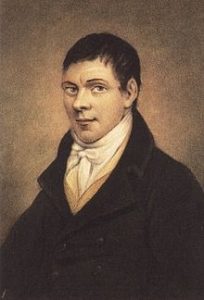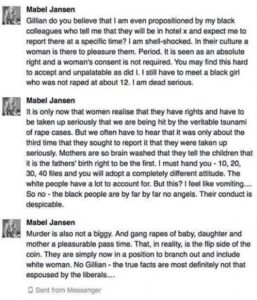- https://PayPal.Me/lukeisback
"Luke Ford reports all of the 'juicy' quotes, and has been doing it for years." (Marc B. Shapiro)
"This guy knows all the gossip, the ins and outs, the lashon hara of the Orthodox world. He’s an [expert] in... all the inner workings of the Orthodox world." (Rabbi Aaron Rakeffet-Rothkoff)"This generation's Hillel." (Nathan Cofnas)
If You Are Jewish, You’re Going To Put Jews First, Right?
If you are a Christian, it would make sense to me that you would put Christians and Christianity first. If you are a Muslim, I would expect you to put Islam first. If you strongly identify as Jewish, it just makes sense to me that you would put Jews and Jewish interests first. The more you identify as black, gay, Jewish, Christian, Muslim, latino, etc, it just makes sense that you are proportionately more likely to put your group first, to think well of your group, and to have some negative views of out-groups.
Jews have it easiest in Protestant countries because Protestants are individualists and tend to look at people as individuals first, rather than as members of a group.
Jews have a harder time in corporate countries, such as Catholic or Muslim or Asian countries. The Japanese, Chinese, and Koreans are as tribal as Jews and they feel no guilt about the Holocaust. East-Asians are harder to manipulate than WASPs, and therefore Jews respect them more.
Most Israelis think of Americans as suckers and an easy mark.
I suspect that much of Israeli admiration of Donald Trump is that they see a lot of themselves in him.
What Do Israelis Think About Americans? Start With Disdain.
By Naomi Zeveloff, March 8, 2015
Though Israel is a famously fractious society, Israelis tend to agree on one thing: Their strongest supporters are an inherently dupable people.
“Most Israelis think Americans are pro-Israel and we can sell them anything, especially mud from the Dead Sea,” said David Lifshitz, the lead writer for the Israeli comedy show “Eretz Nehederet,” or “Wonderful Land.”
“Or — just regular mud with a ‘Dead Sea’ sticker on it.”
But it’s not just American tourists whom many Israelis see as guileless. American foreign policy is held up to similar scrutiny here, even as Israel receives billions of dollars in foreign aid from the United States each year.
“Americans are perceived to be naive, especially when it comes to the Middle East,” said Uri Dromi, who served as a spokesman for the Yitzhak Rabin and Shimon Peres governments. “It is a bad neighborhood and it seems like they just don’t realize it.”
The naivete Israelis perceive in Americans is not just something they believe only Israel’s adversaries exploit; Israelis believe they can do so, too — and do. In a secretly recorded video of a 2001 discussion with a group of terror victims in the Ofra settlement in the Israeli occupied West Bank, now-Prime Minister Benjamin Netanyahu laid out this widely held perception.
“I know what America is,” Netanyahu, told the settlers . “America is a thing that can be easily moved, moved in the right direction.”
On political hiatus at the time after an election defeat, the once and future Israeli leader was responding to a skeptical settler who asked how he would respond to the global condemnation that could be anticipated if he were, as he proposed, to launch a “large scale” attack on Palestinians in the occupied West Bank and Gaza to counter the second intifada.
“They will not bother us,” he said of the Americans. “Let’s suppose they [the Bush administration] will say something. So they say it — so what? Eighty per cent of the Americans support us. It’s absurd! We have such [great] support there! And we say… what shall we do with this [support]?”
The paradox that Israelis rely on — and expect — American support and yet don’t trust American judgment on Middle Eastern affairs helps explain the recent U.S.-Israel dustup in Washington. On March 3, that clash reached its climax when Netanyahu appeared before a joint meeting of Congress to warn the assembled lawmakers against their own president’s negotiations, together with other countries, with Iran ahead of a possible deal on that country’s nuclear program.
Israelis were split on the value of Netanyahu’s trip to Washington, which was widely seen as a play to the prime minister’s right-wing base before the March 17 election. But most Israelis were in agreement about their premier’s message. About three-quarters of Israelis “don’t trust Obama to be a reliable ally and to deal effectively with the Iranian nuclear threat” said Eytan Gilboa, a senior researcher at the Begin-Sadat Center for Strategic Studies.
That opinion was evident on the Israeli street the day of Netanyahu’s speech to Congress, despite all the administration’s measures on behalf of Israel’s security that Netanyahu took pains to laud.
“Obama is very hostile against Israel,” said Effi Hasut, a 50-year-old hairdresser who was smoking on the patio outside his salon in downtown Jerusalem. “He tried to please the Arab world at our expense. He doesn’t understand them.”
Part of the reason Israelis think Americans just don’t get the Middle East, said Alex Mintz, a political psychologist at IDC Herzliya, is that they consider themselves close front-row observers of American foreign policy in the region. And they have watched the Middle East grow more violent and unstable in recent years, he said.
Of course, Israelis themselves have been much more than just spectators in the region, with a massive impact of their own. But according to Mintz, whose new book, “The Polythink Syndrome,” deals with recent U.S. policy in the Middle East, Israelis are skeptical of American intentions — except when it comes to supporting them. “[Israelis] are appreciative of the strong and solid relationship, with the U.S. But they also caution against subsequent moves of the U.S. in the region because they don’t think those are successful or led to good outcomes,” he said.
Yet there’s another reason that Israelis don’t trust Americans, and that has to do with a wider, powerful strain of mistrust in Israeli society.
“Israelis grow up with the expression of ‘never be a freier,’ i.e., a push-over or loser, someone who can be taken for a ride,” Ari Ben Zeev wrote in his 2001 book “The Xenophobe’s Guide to the Israelis.” “This omnipresent need ‘not to be a freier’ can be traced to 2,000 years of being a struggling minority and also to the Middle Eastern neighborhood rule that everything is negotiable.”
Some Israelis think of American tourists and American immigrants in particular as freiers. In a 1998 study of American Jewish immigrants to Israel, by Linda-Renee Bloch, one interviewee said he felt that Israelis saw him as having made the ultimate freier move by moving to Israel in the first place. In their eyes he fell for Israel’s “sales pitch” and traded the relative ease of American life for Israeli instability.
An American might respond with the saying “Fool me once, shame on you; fool me twice, shame on me,” and observe that this outlook, with deep roots in the American psyche, rebuts the Israeli stereotype of Americans as ever-trusting.
But for many Israelis, the question is, why trust anyone even once?
Posted in Anti-Semitism, Jews
Comments Off on If You Are Jewish, You’re Going To Put Jews First, Right?
My Rebel Irish Ancestor – Michael Dwyer
Wikipedia: Michael Dwyer (1772–1825) was a United Irishmen leader in the 1798 rebellion. He later fought a guerrilla campaign against the British Army in the Wicklow Mountains from 1798–1803.
Dwyer was born in Camara, a townland in the Glen of Imaal County Wicklow. He was the eldest of seven children of farmer John Dwyer and his wife Mary (née Byrne), who had a farm in the widespread fields of Wicklow and supplied the men of the rebellion with food. In 1784 the family moved to a farm in Eadestown.[1] Dwyer was a cousin of Anne Devlin, who would later achieve fame for her loyalty to the rebel cause following the suppression of Robert Emmet’s rebellion.
Dwyer joined the Society of United Irishmen and, in the summer of 1798, he fought with the rebels as captain under General Joseph Holt in battles at Arklow, Vinegar Hill, Ballyellis and Hacketstown. Under Holt’s leadership, he withdrew to the safety of the Wicklow Mountains in mid-July,[1] when rebels could no longer operate openly following their defeat in the disastrous midlands campaign. Dwyer and Holt tied down thousands of troops.
Dwyer and his men began a campaign targeting local loyalists and yeomen, attacking small parties of the military and eluding any major sweeps against them. His force was strengthened by many deserters from the military, who headed to Wicklow as the last rebel stronghold and who became the dedicated backbone of his force, as they could not be expected to be included in any future offer of amnesty.
Due to the constant hunt for him, Dwyer was forced to split and reassemble his forces and hide amongst civilian sympathisers to elude his pursuers. On 15 February 1799 at Dernamuck, he and about a dozen comrades were sheltering in three cottages when an informer led a large force of the British soldiers to the area. The cottages were quickly surrounded, the first two surrendering, but, following consultation, Dwyer and his men decided to fight on in the third one, Miley Connell’s cottage, after negotiating the safe passage of women and children. In the hopeless gunfight which followed, the cottage caught fire and only Dwyer remained unwounded. At this stage, Dwyer’s comrade, Antrim man Sam McAllister, stood in the doorway to draw the soldiers’ fire on him, which allowed Dwyer to slip out and make an incredible escape.
Dwyer later made contact with Robert Emmet and was apprised of plans for his revolt but was reluctant to commit his followers to march to Dublin unless the rebellion showed some initial success. The subsequent failure of Emmet’s rising led to a period of repression and renewed attempts by the Government to wipe out Dwyer’s forces. Methods adopted included attempts to deny him shelter among the civilian population by severely punishing those suspected of harbouring his men, the offer of huge rewards for information, the assigning of thousands of troops to Wicklow, and the building of a series of barracks at Glencree, Laragh, Glenmalure and Aghavannagh and a military road through county Wicklow.
In December 1803, Dwyer finally capitulated on terms that would allow him safe passage to America but the government reneged on the agreement, holding him in Kilmainham Jail until August 1805, when they transported him to New South Wales (Australia) as an unsentenced exile.
Dwyer arrived in Sydney on 14 February 1806 on the Tellicherry and was given free settler status. He was accompanied by his wife Mary and their eldest children and also by his companions, Hugh ‘Vesty’ Byrne and Martin Burke, along with Arthur Devlin and John Mernagh. He was given a grant of 40.5 ha (100 acres) of land on Cabramatta Creek in Sydney. Although he had originally hoped to be sent to the United States of America, Michael Dwyer was later quoted as saying that “all Irish will be free in this new country” (Australia). This statement had been used against him and he was arrested in February 1807 and imprisoned. On 11 May 1807, Dwyer was charged with conspiring to mount an Irish insurrection against British rule. An Irish convict stated in court that Michael Dwyer had plans to march on the seat of Government in Australia, at Parramatta. Dwyer did not deny that he had said that all Irish will be free but he did deny the charges of organising an Irish insurrection in Sydney. Dwyer had the powerful support of Australia’s first Jewish policeman, John Harris, who expressed the opinion in court that he did not believe that Dwyer was organising a rebellion against the Government in Sydney. On 18 May 1807, Dwyer was found not guilty of the charges of organising an Irish insurrection in Sydney.
Governor William Bligh disregarded the first trial acquittal of Michael Dwyer. Bligh who regarded the Irish and many other nationalities with contempt, organised another trial for Michael Dwyer in which he was stripped of his free settler status and transported to Van Diemens Land (Tasmania) and Norfolk Island. After Governor Bligh was overthrown in the Rum Rebellion in 1808, the new Governor of New South Wales, George Johnston, who was present at Dwyer’s acquittal in the first trial, ordered that Michael Dwyer’s freedom be reinstated. Michael Dwyer was later to become Chief of Police (1813–1820) at Liverpool, New South Wales but was dismissed in October for drunken conduct and mislaying important documents. In December 1822 he was sued for aggrandising his by now 620 acre farm. Bankrupted, he was forced to sell off most of his assets, which included a tavern called “The Harrow Inn”, although this did not save him from several weeks incarceration in the Sydney debtors’ prison in May 1825. Here he evidently contracted dysentery, to which he succumbed in August 1825.
Originally interred at Liverpool, his remains were reburied in the Devonshire Street cemetery, Sydney, in 1878, by his grandson John Dwyer, dean of St Mary’s Cathedral.[1] In May 1898 the coincidence of the planned closure of the cemetery and centenary celebrations for the 1798 rebellion suggested the second re-interment of Dwyer and his wife in Waverley Cemetery, where a substantial memorial was erected in 1900. The massive crowds attending Dwyer’s burial and the subsequent unveiling of the monument testified to the unique esteem in which Irish-Australians held the former Wicklow hero.[2]
Dwyer had seven children and has numerous descendants throughout Australia. In 2002, in Bungendore near Canberra, a family reunion took place, with Michael Dwyer’s descendants joining descendants of related Australian Irish families, the Donoghoe’s and the Doyles. In 2006, a reunion also took place to mark the 200th anniversary of the arrival of the Tellicherry in Botany Bay. One of Michael Dwyer’s sons was the owner of The Harp Hotel in Bungendore, New South Wales in circa 1838. Dwyer’s nephew, John Donoghoe (1822–1892), built The Old Stone House, Molongolo Rd, Bungendore, in circa 1865. This dwelling is a strongly constructed Bungendore landmark and a monument to pioneering and hard-working Irish Australian settlers.
Caitlyn Jenner Experienced ‘Sex Change Regret,’ Might De-Transition, Biographer Says
Chaim Amalek writes: “Future generations will come to regard this generation’s elite encouragement of “gender reassignment surgery” the way we regard previous generation’s use of prefrontal lobotomies as a way of treating mental illness. Simply barbarous.”
Friend: “It will be fascinating to see how the media and politicians treat Jenner’s return to being a male, if it does happen. If he showed courage in transitioning to female, what does it show to become a male again. What will this do to the whole normalization of transgenderism now being promoted not only among teenagers but with very young children?”
The Wrap: “It hasn’t been easy for Caitlyn, it’s been very hard,” Ian Halperin recalls one source telling him
Caitlyn Jenner, who announced her transition from man to woman last year, has considered de-transitioning, the author of a new book about the Kardashian family told TheWrap on Wednesday.
Ian Halperin, the author of “Kardashian Dynasty: The Controversial Rise of America’s Royal Family,” said that, while researching his book, multiple sources told him that the former Olympian had been miserable for months and has considered transitioning back to a man.
“One source confirmed to me Caitlyn has made whispers of ‘sex change regret,’ hinting she might go back to being Bruce Jenner,” Halperin said.
Posted in Trans
Comments Off on Caitlyn Jenner Experienced ‘Sex Change Regret,’ Might De-Transition, Biographer Says
WP: Rape is black people’s ‘pastime,’ white South African judge says in Facebook rant
Race divides every country with lots of races. It is not a problem unique to South Africa or to the United States.
Washington Post: South Africans aren’t blind to the fact that race still divides their country. But when an activist named Gillian Schutte went public recently with messages she had exchanged with a high court judge a year ago, she certainly achieved her stated goal: to expose the “deep racism and colonial thinking” that still pervade upper echelons of South African society.
Mabel Jansen, who is the daughter of a former governor-general of South Africa during the apartheid years, sent the messages last May, and says she was trying to explain specific cases of sexual violence in a private context.
But the language she used was anything but specific.
“In [black people’s] culture, a woman is there to pleasure them. Period,” she wrote. “I still have to meet a black girl who was not raped at about 12. I am dead serious.”
“The white people have a lot to account for. But this? I feel like vomiting,” she continued. “So no – the black people are by far by far no angels. Their conduct is despicable.”
South Africa’s Minister of Justice Michael Masutha placed Jansen on “special leave” on Wednesday, following a slew of complaints from all sides of the government, and from other judicial officials.
Both the African National Congress, which has been in power since white minority rule ended in 1994, and the main opposition party, the Democratic Alliance, condemned the outburst. The ANC said it intends to tighten anti-racism laws. According to Agence France-Presse, the women’s league of the party stated that Jansen’s “comments made on Facebook where she claims that the rape of young children is part of black culture, are purely racist and misrepresentation of facts about black culture,” and questioned whether Jansen would be able to deal fairly in court with rape cases.
Official statistics show that 43,195 rapes were reported in South Africa between April 2014 and March 2015, but most go unreported. South Africa has one of the highest rates of rape and violent crime of anywhere in the world.
The racial divides of apartheid also have been slow to dissolve, with most South Africans still living in neighborhoods that are de facto segregated, and the income gap between whites and blacks has only widened since the end of apartheid.
The uproar surrounding Jansen’s comments has brought other aspects of her history to light. In a wide-ranging 2013 interview with the country’s Judicial Services Commission, she repeatedly played down her grandfather’s role in supporting apartheid, and claimed that her professional journey was almost as hard as any black South African’s because she is a woman, going so far as to say that there is an “apartheid between men and women.”
“I believe I know what hardship means,” she said in the interview. “I know what it is to be in a disadvantaged position.”
Posted in Blacks, Rape, South Africa
Comments Off on WP: Rape is black people’s ‘pastime,’ white South African judge says in Facebook rant




